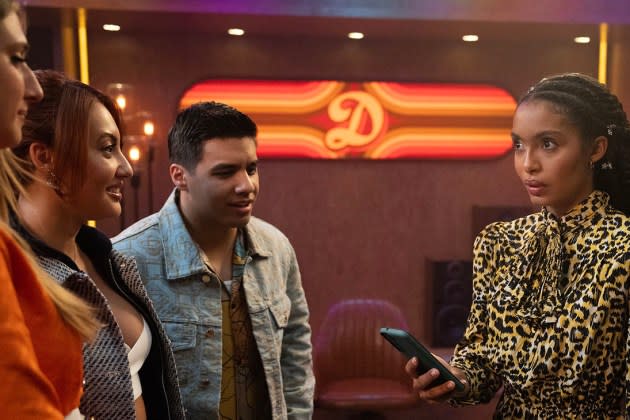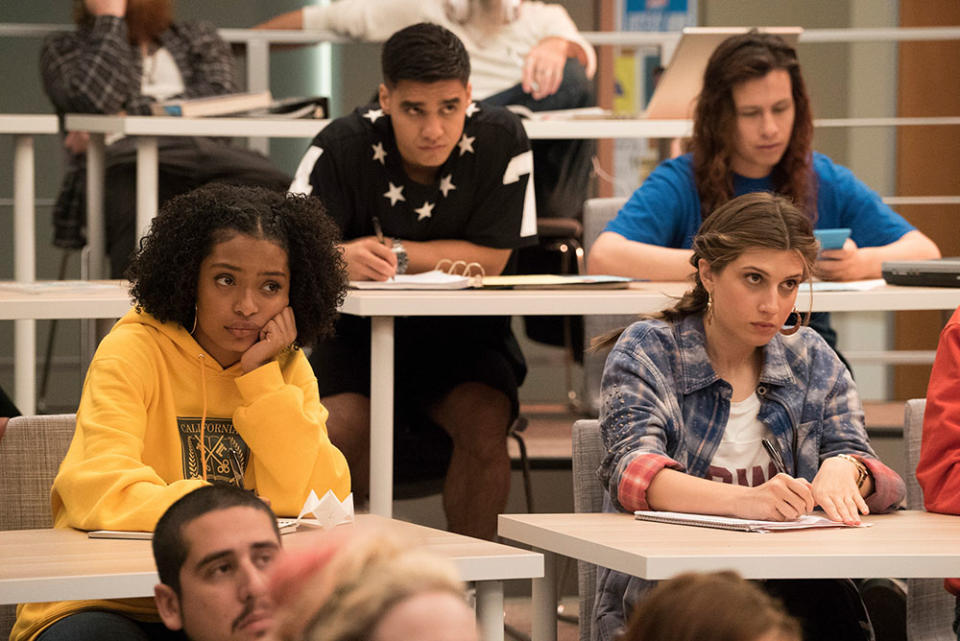Yara Shahidi Reflects on Closing Out ‘Grown-ish’

Taking cues from The Cosby Show’s iconic spinoff A Different World but updated for some 30 years later, Grown-ish, the Black-ish spawn premiered on Freeform in January 2018 by following Yara Shahidi’s Zoey Johnson, Dre (Anthony Anderson) and Bow’s (Tracee Ellis Ross) firstborn, to college. Similar to its predecessor, Grown-ish tackled many controversial topics, including university investment in the prison system, drug use, pre-NIL exploitation of college athletes, sex, the value of college and more, but did so with a fresh voice and perspective.
Zoey’s college world included her competing love interests — woke Black campus activist Aaron (Trevor Jackson) and ultimate hipster Luca (Luka Sabbat) — as well as Latina Republican Ana (Francia Raìsa), Jewish rebel Nomi (Emily Arlook), first-generation Indian American and all-around hustler Vivek (Jordan Buhat), Olympic-bound South Los Angeles track stars Jazz and Sky (sisters Chloe and Halle Bailey, who perform the show’s theme song) and later, laidback East Coast cool kid Doug (Diggy Simmons).
More from The Hollywood Reporter
Fortunately, Zoey’s own graduation didn’t end the Kenya Barris-created series. Instead, Marcus Scribner, who played Zoey’s younger brother Junior (also Andre or Dre) on Black-ish, took the reins in season five, joining holdovers Aaron (a Cal U instructor), Doug (an ambitious bar manager), the recurring Zoey who’s pursuing her fashion career in New York, and Luca’s younger sister and fellow student Kiela (Daniella Perkins). Cal U newcomers like influencer Annika (Justine Skye) and driven first-generation American Zaara (Tara Raani), who is queer, among a few others, also spiced up the remix.
Over the six seasons (typically broken up in micro units of winter/spring and summer runs), many buzzy guest stars checked in, including Kelly Rowland, Joey Bada$$, Latto, Lil Yachty, Saweetie, NLE Choppa, Omarion, Yung Miami, Anderson .Paak, D.C. Young Fly, Jordyn Woods, Ryan Destiny, La La Anthony, Winnie Harlow, Da’Vinchi, Druski and sports super-agent Rich Paul. Other familiar faces included A Different World’s Kadeem Hardison and The Cosby Show’s Malcolm Jamal-Warner. Former First Lady Michelle Obama even gave her stamp of approval in a season two storyline centering on her. Plus, Drake has been a reference throughout the series.
Even with all the glitz, however, the show never veered from its goal to represent and empower young people in all their many facets. The Hollywood Reporter caught up with the 24-year-old Shahidi, who is also one of the show’s executive producers, to discuss closing out Grown-ish as it releases its series finale, “Grown.”
***
How does it feel to finally share the very last episode with the audience?
It’s pretty surreal, I’d have to say. I think when we filmed it, obviously emotions were high, because not only were we ending the storylines that we’ve played for six years, but it’s also the conclusion of so many wonderful work relationships. But I think what’s making it feel real is knowing that this is one of the last times we get to gather with our audience in real time to share these stories. My Nana was texting me [last week], “So, what’s going to happen? Is Luca making his way back into his love triangle?” And I was like, “Gotta wait a week. I love you.”
From the very beginning, Grown-ish was a very distinct entity from Black-ish.
That was intentional. And I have to give credit to Kenya Barris, Larry Wilmore, Craig Doyle, Julie Bean, kind of the OGs of the show, because I think they knew in many ways that Black-ish is a certain type of magic that we weren’t even trying to re-create. And I think because of that awareness, the next question was, “Well, what’s something distinct and different that would allow us to tell these college stories in a unique way?” So, of course, you have certain throughlines of being a character from Black-ish, the family element, of, you know, striving to have the difficult conversations. But, other than that, it was really about defining what Grown-ish is on its own…. We found a different tone and even a different visual aesthetic. So when you look at the visuals of the show, they’re very unique.
And we had a fun time playing with it. I’d have to say, even from its inception when we shot what they call a backdoor pilot, which was that episode of Black-ish when Zoey goes to college, there’s so much that evolved between then and when we properly got on set to shoot the show. Not only was it called like three different things; I think its first name was Liberal Arts and then its next name was College-ish and then we got to Grown-ish. But initially, there was going to be a lot more of an adult presence. And I think part of the beauty of being on Freeform was that they weren’t afraid of taking a risk of having a very young cast and having a young lead in places where that can be quite uncommon. And so the show evolved between shooting the pilot to getting on set and really deciding that this was really going to be a youth-forward show.

With Zoey and other castmembers, Grown-ish never shied away from controversial or real-life challenges. What are some memorable moments for you and/or takeaways?
There are many memorable moments, because people that know Yara know that I’m not Zoey. So there’s a lot of things she got into that are memorable for me. I’m grateful to the writers for honoring me as a young person and finding ways to accomplish those storylines in a way where I felt comfortable. That’s no small task, because I remember we were shooting one episode for four days. And so let’s say by day 11, we were three episodes in, and I had kissed two boys already and was about to kiss another one. And I remember looking at the writers and saying, like, “Look,” especially at the time, I hadn’t even had my first boyfriend. I was like, “This is a lot for me, quite honestly.” And when I tell you, they really respected that and slowed down the pace for me. So, kudos to them for finding that bridge.
As a young Black woman, I feel like there’s such pressure to perform and to be excellent every time you’re out in the world. And I have to say there’s something actually quite freeing about playing a character like Zoey who was making mistakes, and unabashedly learning, falling, getting back up, sometimes falling over the same thing time and time again. Because my feeling is, “Oh, we should have permission to do that.” And I even had to move through moments of judging my own character, to say, “Well, is this not real life?” and move through discomforts of being like, “Well, why wouldn’t she have learned by now?” But that’s just being in your 20s.
Talk about Marcus stepping up as Dre and his impact, as well as how you guys wrap all of this up into one final episode.
I’m so grateful that Marcus stepped into this. And all our new castmembers stepped in with such an excitement to bring something unique to the show [along with] their own personalities. I had been pitching Marcus joining us since season one, and so, when they called me that it was happening, I was over the moon. But the writers had a big task because, when you think about it, suddenly our cast was double the size and there’s a lot of stories to end.
Obviously, neat endings aren’t always real life, but there were certain moments we wanted to focus on [especially with Zoey]. Zoey has a lot of times been fairly accused of being a narcissist and being a little too self-centered. So I think there were certain moments where it was, like, where do we want to close the loop on that? She doesn’t need to come out a saint, but where do we get to see as an audience that she’s attempting to do the work? She’s self-aware, she’s mindful and I think it’s not only this last episode [that shows this], but the last handful of episodes were very important. Her fighting her old self, while totally comical, it’s supposed to be this symbolic moment. Whether she does it perfectly or not, she’s actually looking and reflecting on who she used to be. And who she used to be is a woman that sees Aaron happy with his girlfriend [Edie played by Kelly Rowland] and marches right in to say, “Hey, look, I still have feelings for you. So, what are you going to do about it?” Who she chooses to be is, “He’s happy, and who am I to get in the way of that?” And that may be small to some, but I think anybody that knows the history of Zoey knows that’s a big deal.
I think it’s moments like that that we really focused on, especially in the finale. But just being honest, it’s not going to be an absolute perfect self-growth moment, but you at least feel like you’re leaving us and each character on a forward positive journey. We’ve acknowledged what needs to be done and are moving toward it. So you, at least, are able to finish the show knowing that something good is coming their way. I think they did a wonderful job of implying that there’s a lot of life these characters have yet to live.
Marcus reenergized Zoey in so many fun ways. And I had such a fun time, especially in this last season, being able to get back to being a big sister. I think it’s an element on the show that we didn’t get to see once Zoey was away from her family. But it adds, I think, so many sweet moments for both of them because you have two young people that aren’t that far apart in age — and, in fact, Marcus is a month older than me — that get to do a lot of reflecting and reflecting back to each other. Like sometimes Junior knows something that Zoey doesn’t. Sometimes Zoey is able to add a little tidbit that settles Junior. Sometimes they’re each other’s worst nightmare.
That’s my very vague, non-spoiler way of saying I think the writers did a good job of kind of tapping back into the best of the best of the dynamics and the feelings that the show brings and sending each character kind of on their way.
The Grown-ish series finale aired Wednesday on Freeform and streams on Hulu.
Best of The Hollywood Reporter